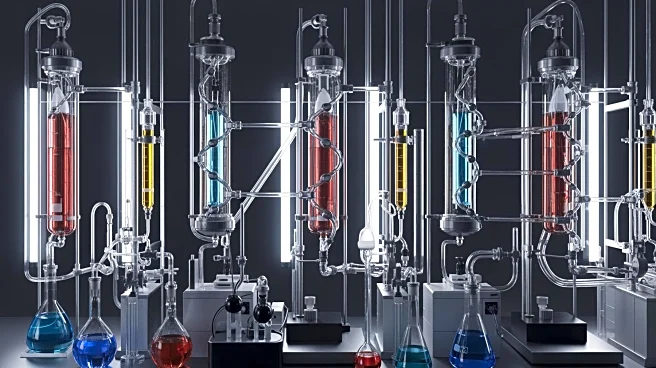What's Happening?
Ukraine is currently the only nation capable of producing a specific type of solid rocket fuel essential for its long-range ballistic missile projects, such as the Sapsan. This capability is attributed
to a combination of scientific expertise, inherited industrial infrastructure, and access to proprietary Soviet-era technologies. The fuel, which includes ammonium dinitramide (ADN) and aluminum hydride, allows for missiles with extended range and payload capacity. This technological edge stems from developments in the early 1970s by Soviet scientists, which the United States only discovered two decades later. Despite the U.S. patenting ADN, Ukraine had already established industrial production of this rocket fuel. The Pivdenne Design Bureau in Ukraine has leveraged this technology to develop advanced intercontinental ballistic missiles (ICBMs), such as the RT-23, which features a sophisticated third-stage fuel composition.
Why It's Important?
The ability to produce this advanced missile fuel gives Ukraine a significant strategic advantage, particularly in the context of its ongoing conflict with Russia. The unique fuel composition allows Ukraine to develop missiles with greater range and payload, enhancing its defense capabilities. This development is crucial for Ukraine's sovereignty and security, as it enables the country to maintain a robust defense posture without relying on external sources for critical military technology. The U.S. and other advanced missile producers, like South Korea and Turkey, face challenges in replicating this fuel composition, underscoring Ukraine's unique position. The geopolitical implications are significant, as Ukraine's ability to independently produce such technology could shift regional power dynamics.
What's Next?
Ukraine is likely to continue developing its missile production capabilities, focusing on achieving ammunition and missile sovereignty. This effort is supported by experts like Zinoviy Pak, who aims to restore Ukraine's missile production capabilities. The introduction of new ballistic missiles, such as the FP-9, which can strike targets up to 855 kilometers away, indicates Ukraine's commitment to expanding its strategic reach. As Ukraine enhances its missile technology, it may face increased scrutiny and pressure from other nations concerned about regional security dynamics. However, Ukraine's focus will likely remain on strengthening its defense capabilities to ensure national security.










